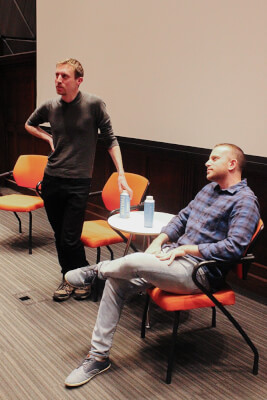
The Media Arts and Culture (MAC), American Studies and Writing & Rhetoric departments as well as the Black Studies program hosted a screening of the film “BlacKkKlansman” in a full Choi Auditorium Nov. 15. The screening was followed by a Q&A with two of the film’s screenwriters, David Rabinowitz and Charlie Wachtel. MAC professor Aleem Hossain, who was involved in the planning of the event, said the screening came together because of the collaboration across departments. According to Hossain, cognitive science professor Alexandra Sherman had a connection to the screenwriters and invited them to campus.
Hossain joined the MAC department in March 2018. He wanted to bolster the filmmaking and screenwriting aspects of the MAC major during his first year at Occidental, and hosting this event was the first step.
“Across campus, there are all these wonderful films and screenings, but so often they are archival old titles or they’re really niche, and I love those films but it’s cool [that] this movie was released in a lot of theatres, the national press talks about it a lot and we’re not like revisiting it five years from now,\; it’s right now,” Hossain said.
The film is based on the life of Ron Stallworth, the main character in the film, and the screenwriters worked with Stallworth to ensure the screenplay was as accurate as possible. During the Q&A, Rabinowitz and Wachtel said they had multiple four-hour phone calls with Stallworth and discussed every page in the screenplay.
“BlacKkKlansman” is about an African-American police officer in Colorado Springs who embarks on an undercover investigation of a Ku Klux Klan (KKK) branch in their city. The main character, Ron Stallworth, infiltrates the KKK by masquerading as a white man and calling to join while his partner, Flip Zimmerman, impersonates him and meets the KKK members in person. Rabinowitz and Wachtel mentioned that they have faced controversy over both of them being white and whether they should be the ones to tell Stallworth’s story.

The film addresses topics such as racism, anti-Semitism and politics in the 1970s, but also ties into the present political climate. For example, the film included references to Trump’s slogans — Rabinowitz and Wachtel said many of these references were additions made by director Spike Lee.
“I have questions to ask about the film, and it’s kind of awesome to be like, ‘There are political issues raised by it, artistic issues,’ and to actually ask two of the guys who were really involved in it,” Hossain said in the Q&A. “I think that’s why I’m really excited to have those questions answered, rather than posing them alone, on my own.”
According to Hossain, this event differs from other film screenings because of the film’s novelty as well as the presence of the creators behind it. For Hanna White (junior), this was what encouraged her to go to the event.
“I had really wanted to see the movie, but I did not live in a place where the movie was shown,” White said. “I was really excited to watch the movie first of all, but also, I’ve never participated in anything where there’s an actual talk with the creators of whatever it is that you watch, so I thought that was a really cool opportunity to be a part of.”
Francisco Hudson (sophomore), a MAC major, attended the event and said the political and social influences in the film were powerful. A scene that stuck out to Hudson is when Zimmerman, a Jewish man, talks about the concept of being able to pass as white. Hudson said the representation of people that are “passing” in the film resonated with him because he is half Hispanic but often passes as white.
“We talk about mixed race but there are smaller groups like passing — not that they necessarily need a bigger voice — but there should be representation of a lot of different kinds of people,” Hudson said. “Seeing more provides different kinds of stories; it has different complexes in people’s minds and it’s things that people maybe haven’t thought about on screen.”
The film ended with documentary footage of the white supremacist rallies in Charlottesville, VA in 2017. The crowd fell silent as the footage played. Hudson emphasized the impact this inclusion had on the film and how racism has disguised itself in modern-day policies and ideology and is not as overtly displayed as it is in “BlacKkKlansman.”
“I think movies like ‘BlacKkKlansman’ are good because not only do they allow us to reflect on the past, but how it relates to the present, and in that way, it’s really powerful,” Hudson said.
![]()






























